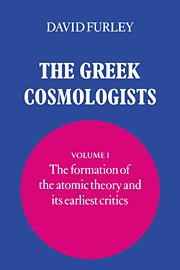Book contents
- Frontmatter
- Contents
- Preface
- 1 Two pictures of the world
- 2 The judgement of Socrates
- 3 The beginning in Miletus
- 4 Two philosophical critics: Heraclitus and Parmenides
- 5 Pythagoras, Parmenides, and later cosmology
- 6 Anaxagoras
- 7 Empedocles and the invention of elements
- 8 Later Eleatic critics
- 9 Leucippus and Democritus
- 10 The cosmos of the Atomists
- 11 The anthropology of the Atomists
- 12 Plato's criticisms of the materialists
- 13 Aristotle's criticisms of the materialists
- Bibliography
- Index of passages
- General index
3 - The beginning in Miletus
Published online by Cambridge University Press: 27 January 2010
- Frontmatter
- Contents
- Preface
- 1 Two pictures of the world
- 2 The judgement of Socrates
- 3 The beginning in Miletus
- 4 Two philosophical critics: Heraclitus and Parmenides
- 5 Pythagoras, Parmenides, and later cosmology
- 6 Anaxagoras
- 7 Empedocles and the invention of elements
- 8 Later Eleatic critics
- 9 Leucippus and Democritus
- 10 The cosmos of the Atomists
- 11 The anthropology of the Atomists
- 12 Plato's criticisms of the materialists
- 13 Aristotle's criticisms of the materialists
- Bibliography
- Index of passages
- General index
Summary
There are many good histories of early Greek philosophy, and it is not necessary to the purpose of this book to attempt to rival them. We must try to pick out the themes outlined in the earlier chapters, without encumbering the narrative with too much detail. The reader must be warned, however, that this selectivity is certain to be controversial. The evidence for the theories of the sixth and fifth centuries b.c. is scrappy and ambiguous: we lack the context of the short quotations that survive – the longest consecutive fragment is sixty-six lines of verse. It is just possible that we have the whole intent and direction of some fragments wrong. That is not likely, because the tradition has been subjected to the most careful criticism by many generations of scholars and philosophers; but there is no general consensus on some important questions, and the possibility of misinterpretation is open. This is as a rule not true in the case of philosophers like Plato and Aristotle, whose work survives either completely or in bulk.
The main theme to be picked out is the one emphasized by Plato, in the passage of the Phaedo that we discussed in chapter 2: the explanation of the world in terms of matter in motion. We must begin, however, briefly, at the beginning: that means, with the three philosophers who lived in the sixth century b.c. in the prosperous Greek colony at Miletus, on the coast of Asia Minor – Thales, Anaximander, and Anaximenes.
- Type
- Chapter
- Information
- The Greek Cosmologists , pp. 16 - 30Publisher: Cambridge University PressPrint publication year: 1987

